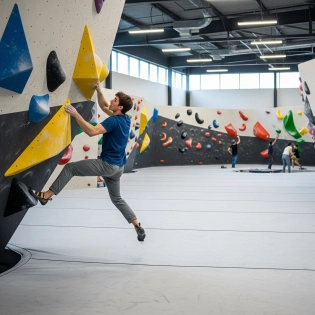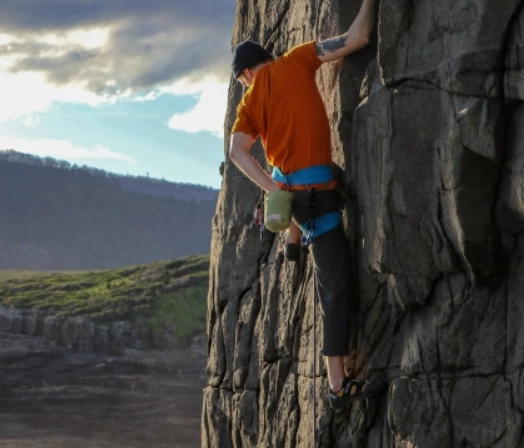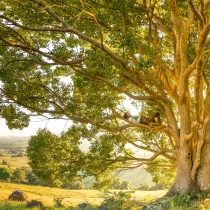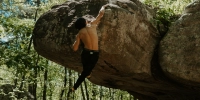


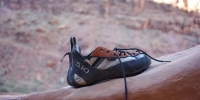




Climbers Point
Very often, climbers can experience weak days. These are days that they just feel as if they have no power and no energy to climb at the level they normally can. This is not unique to climbing, or to sports in general. It's just part of being human.
Some people feel this way due to fatigue, they may be pushing their body too much and not giving it the amount of rest it needs. This can cause you to just feel very sluggish and weak, resulting in a weak climbing day when you just don't have the energy to climb, or don't have the power to do moves you normally would be able to.
Distractions are also very common. People who are distracted by something and who are not focused on the climbing session can very easily feel this in their climbing. They will just not be in the zone, not be focused on what they are doing, and this can very easily result in not being able to climb at the level you are used to climbing at.
Some climbers may also face medical issues. Depression, for example, is one that can really affect your climbing, and your whole life in general. If you notice that you are just not able to climb and don't feel the way you normally feel, and this feeling lasts, it is highly advised to go see a specialist as this may be something more serious than just an off day.
Having weak climbing days can also be a result of your eating habits. Some people feel very weak and shaky if they don't eat a little bit before their climbing session. Others, on the other hand, may feel the opposite, and eating even a small meal an hour before their climbing session could make them just feel heavy and tired.
You could try remembering or writing down each time this happens and how you were feeling, or what you ate before, or any other important details you may have, and then to try and find a common element shared by these days. This could be a great way to find the cause, and eventually, a solution.
Climbing is a lot of fun and attractive to many people seeking a new hobby or simply to get into a new sport because it is a sport that doesn't require much gear, or even strength, and provides both a physical challenge and a mental challenge.
To be a good climber and to progress in the sport, you do not necessarily have to be very strong. Having good technique, and a good understanding about climbing, about your strengths, and about your climbing style, can give you a great advantage while climbing.
This basically means that anyone who is physically capable can start climbing. You don't have to be strong, you don't have to have previous experience in other sports or at lifting weights. Though those things can help a lot, they are not required, and strength will build as you climb. Understanding climbing and developing good technique can compensate for less physical strength.
Climbing is also a great mental activity and challenge. In bouldering, for example, each route is also known as a problem, the climber must understand the problem and solve it using just their body. This means that they need to understand how the route can be climbed, and how to adapt that solution to their body, or to find a solution that will fit their capabilities.
Very often, the better solution to solving the problem will not be the more powerful solution that requires a lot of strength, but rather, it will be the solution that requires great technique. Though, it can be a combination of having great technique, strength, flexibility, and experience.
So what is fun about climbing is that it really isn't just a physical sport that requires you to be very strong. It is very much a mental challenge as much as it is a physical challenge. So for those who love sports and puzzles, climbing can be a lot of fun.
It depends on if you are a new climber or someone who already has some experience in climbing.
If you are a new climber, then you will probably be more sore than people who have climbed even a few more times than you. One of the main reasons is because some of the muscles that are sore are actually muscles that most people do not use very often.
Climbing puts your body in positions it normally does not go into in day to day life, and not even in many other sports. It also requires you to use muscles differently to be able to stabilize yourself on the wall and climb your way up.
It is very normally for muscles you have never felt before to feel sore, this includes your forearms, back, shoulders, biceps, legs, and many other smaller muscles. If you are a beginner, you will probably also feel some soreness in some very small muscles that do not get used very often, they are used in climbing!
Once you get past the first few initial climbing sessions, the amount of muscles that become sore lessens, but, this really depends on your climbing intensity. If you always have very intense climbing sessions, you can expect your muscles to be pretty sore. But, as you get used to climbing, the soreness goes away, almost to the point where you are not even sore.
More experienced climbers are able to climb day after day, even, depending on the intensity at which they are climbing. This is because their muscles have gotten used to the tension climbing puts on them, and they have strengthened to the point where the normal climbing sessions do not bother them that much. They would need to have a really intense climbing session for those muscles to get sore.
There is no weight limit to climbing, everyone can climb regardless of their weight. Though, those that are overweight may have a higher risk of injury and should be aware of this and be extra careful.
People who weigh more usually tend to have a more difficult time climbing than those who weight less. This is because they need to hold much of their weight on their hands and fingers, which can be very difficult if their fingers are not strong enough to hold this weight and to perform the moves needed for climbing.
Though weight can make climbing more difficult, it doesn't mean you have to be super skinny. There are many great climbers that are on the heavier side, it just means that your fingers and muscles will have to be very strong to be able to pull your weight.
This is all true not just for those who have a high body fat percentage, it is also true for those with a high level of muscle mass. Bodybuilders, for example, may have a difficult time climbing since they will have to pull their whole weight on the wall, which, depending on the size of the bodybuilder, can be a lot.
Being in shape and having a background in some kind of sport can be a benefit when starting to climb, but, it is not a requirement. Almost anyone, regardless of how fit there are and their weight, can climb.
While you climb, you will probably start to feel muscles that most refer to as "muscles they have never felt before and didn't know existed". This is because climbing utilizes muscles that most people usually do not use that often, at least not in the way climbing uses them. This is especially true for people who do not come from a fitness background of some kind.
Climbing in itself can help you get in shape, but getting in shape also depends on what you do outside the climbing gym or away from the rocks. It has to do with how you treat your body, how often you climb or exercise, if you stretch and work on preventing/treating injuries, and of course on your diet.
Neither are necessarily harder than the other, It depends on the grade of the route you are climbing and your skills as a climber. You could climb a 5A top rope route that would be equally easy as a 5A lead route. You could also climb an 8A top rope route, and it would be just as hard as a lead route.
One element that could make lead climbing harder than top rope is the fact that you have to clip your rope into quickdraws while climbing. To do this, you have to be efficient at clipping, and you have to be efficient at resting, since clipping, although it may take a fraction of a second, can tire the climber out if they are not efficient at clipping or if the route is just very difficult.
On the other hand, many people who top rope and auto belay may find it a little bit tricky to make their way around the rope that is always in front of them, which sometimes could be a hassle, especially if you are on a very difficult route and the rope is in your way, and you have to move it, or yourself, to get to the next hold. This, like with lead climbing, requires technique and skill.
All forms of climbing have their difficulties, there is not necessarily a harder climbing form than another. Many factors come into play with this question, and it depends greatly on the climbers themselves.

